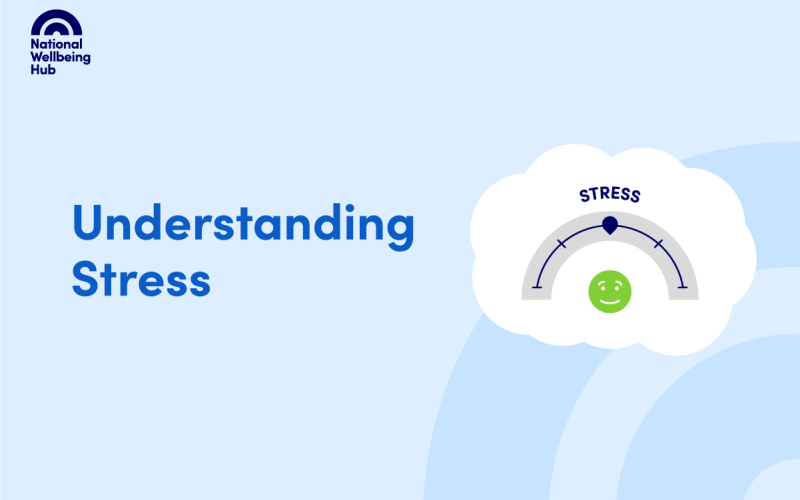Managing your worry & anxiety

We all feel anxious at some point in our lives and sometimes that anxiety can be helpful as it can alert us to possible dangers. Uncertainty and anxiety often go hand in hand and there are a lot of stressors which can contribute to this, such as increasing workloads, staff shortages, personal finance worries, and more. So it’s understandable that you might find your anxiety levels increasing or fluctuating.
Our brains, however, like predictability and a sense of control. When we don’t have these the survival parts of our brain can be activated. This can make us more likely to focus on things that seem more threatening, for example frequently checking the news or catastrophizing about the future. While many of our worries may be warranted, it’s important to try to manage your worry and anxiety so that it doesn’t start to feel overwhelming or cause feelings of panic.
In an attempt to cope with our anxious feelings we can engage in coping strategies that in the short-term seem helpful but in the long-term can increase our anxiety and maintain it. Often people avoid situations that cause them anxiety.
It can also be tempting to self-medicate with alcohol or other drugs in an attempt to cope with the feeling. Alcohol is a depressant, although we often associate it with lifting our mood, in reality it is having the opposite effect and can negatively impact on our sleep. Poor sleep can lead to a lowering of mood and increased anxiety. If you are concerned about how much you’re drinking you might find it helpful to complete this self-report questionnaire. You can also listen to a podcast here featuring an addictions doctor discussing their own recovery from alcohol addiction.
Things that can help
It can help to try to keep your mind focused on the present moment and on what you can currently control. To help you feel more in control try the following:
Think about your breathing. Taking slow, deep breaths, in through the nose and out through the mouth. Punctuate your day with a breathing exercise; regular breathing exercises throughout the day will help to lower your levels of anxiety or stress. Try doing a breathing exercise when you first wake-up, in the shower, while waiting for the kettle to boil, while waiting at the bus stop/traffic lights etc. You can also try these breathing exercises. You may also find this 10-minute guided relaxation podcast helpful.
Keep a routine. Regular sleep and activity will help you feel more in control, predictability helps to reduce uncertainty and anxiety. Having enjoyable activities to engage in, gives you something else to focus on. If you’re having difficulty sleeping try Sleepio or the sleep module on Silvercloud. You can find all of these on our Free apps and online programmes page.
Grounding exercises. Grounding exercises help you to focus on what is currently happening and what is around you, helping to shift your attention from your feeling of anxiety or your anxious thoughts. The most common grounding exercise is the 5,4,3,2,1 method:
Sit yourself in a comfortable position and take a breath in and out. Focus on
5 things that you can see
4 things that you can feel
3 things that you can hear
2 things that you can smell
1 thing that you can taste
Set aside a ‘worry time’. Set aside 10-15 minutes of ‘worry time’ a day. During the day if you find yourself worrying, remind yourself that you have ‘worry time’. When ‘worry time’ comes, set a timer or alarm and during that time write down all your worries. When ‘worry time’ finishes engage in an enjoyable activity (going for a walk or other exercise, cooking, reading, talking to friends) that you planned earlier.
Worry time will help you to identify what is causing the anxiety and stress. Once you know what the possible causes of your anxiety or stress are then you can begin to find solutions that are within your control.
Reduce avoidance. Often when we are anxious we avoid the things that are making us feel this way. The avoidance of situations can increase our anxiety. By reducing the avoidance and confronting the anxiety-provoking situation you learn that you can manage the situation so that next time it occurs it feels less threatening and you feel more confident in your skills. For example people often put off opening the post as they are worried about receiving a large bill and feel overwhelmed. By continuing to put off opening the bill anxiety increases. Opening the bill and contacting the firm that sent it to discuss how to pay it in reasonable instalments will solve the problem, give you a sense of achievement and help you to feel more confident in dealing with a similar issue in the future.
Try one of these apps.
Daylight is very helpful for managing anxiety, while Silvercloud has programmes to help with sleep difficulties, low mood and building resilience. You can find both of these on our Free apps and online programmes page.
Videos/Podcasts
You might find it helpful to listen to or view our webinar session on ‘Anxiety – what it is, and how we can manage it’. The session concludes with some useful practical tips for managing anxiety. You can watch a video of the session here or you can find a podcast version here, which is also available on our Spotify page.
More support
NHS Inform has a good self-help guide for managing anxiety and some helpful videos
If you find that your anxiety levels are getting too much for you to cope with and they are affecting your performance at work or your homelife, seek professional help through the Workforce Specialist Service, or your local psychology service (please note, the Workforce Specialist Service is open to regulated professionals only).

Welcome to the Hub. We hope you’ll find the support you’re looking for. To help us improve the site and make it relevant to you, please take a minute to answer a few quick questions. Thank you.
Give us feedback








